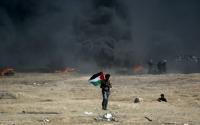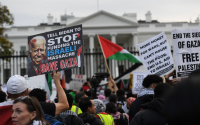Suzanne GoldenbergAugust 12, 2002
There was gunfire on the day I moved out - a crack or two, followed by a burst of automatic fire and silence before the familiar wail of the ambulances made it horribly clear that this wasn't fireworks or a car engine -backfiring. The fatal shooting - a Palestinian gunman shot dead a security guard from the telephone company before being killed himself along with a Palestinian bystander - was just around the corner at the Damascus Gate of the walled city, and sounded very loud from our front porch. The packers, strangers to Jerusalem from the relatively sleepy northern town of Atlit, were shaken. When they had walked through the door, less than three hours before, the television was showing scenes of carnage from a suicide bombing of a bus in the Galilee. Another attack? They turned on a radio to hear the latest score of death, but almost immediately resumed packing.
The moment was a last reminder of the intimacy of the violence of the past 22 months. Most Israelis - even if they and their loved ones have never been close to a Palestinian suicide attack - can identify at least with the location: their bus route, their cafe, their falafel stand. So can Palestinians, of course, with Israeli tanks thundering up and down the streets of their cities and towns in the West Bank.
Children rattle off the calibres of the various weaponry they hear and see deployed around - and far too often at them - by the Israeli army. Almost every single Palestinian I have met here can count someone within their immediate family either dead or injured by Israeli soldiers. Some poor unfortunates have been shot twice, in their own homes. All have their own stories of lesser injury: the casual brutality with which Israeli soldiers restrict normal movement at checkpoints, the mix of fury and boredom after 50 days of living by Israel's clock, under near constant curfew. But despite the proximity with which they live and die, Israelis and Palestinians, in the main, are interested in knowing only their strand of the story. And while it would seem abundantly clear to the outside world that Ariel Sharon and Yasser Arafat have brought only disaster, Israelis and Palestinians appear not to be suffering from doubts, but from certainties.
Increasingly, Israelis are resistant to hearing or seeing anything that challenges their version of events, a nationally adopted cant that basically says: "We are the victims, they are terrorists and the whole world is against us."
Palestinians, naturally, see themselves as universal victims as well. The competition for victimhood reached its apogee a few days after September 11, when Palestinians and Israelis held candelight memorials with astoundingly similar placards: "We know how you feel, we are victims of terrorism too."
The sanctification of victimhood has gone further since then. Liberal Israeli commentators talk about the rise of McCarthyism. At the same time as supporters of Israel rage against the sacking of two Israeli academics from the editorial boards of obscure journals of translation in Manchester, lecturers at Israeli universities face disciplinary measures - sometimes at the instigation of their colleagues - for expressing support for the country's tiny movement of conscientious objectors in the classroom. Peace activists - and they exist only on the margins of Israel's far left nowadays - are also threatened with legal proceedings for encouraging the investigation of Israeli soldiers for war crimes. The limits of Israel's democracy are as circumscribed as they have ever been, says Jeff Halper, an American peace activist who immigrated here in 1973.
"It's gone beyond hostility. You are simply dismissed. People don't listen to you. They have no idea what in the hell you are talking about. It is so clear to people that we are the good guys, and they are terrorists that just want to kill us."
Such certainties do not exist any more in western countries. Since the Vietnam war, Americans have gazed on their military with a large dose of scepticism. Nobody seriously believes the army is always right. But despite two years of atrocity and siege, and growing criticism in Europe and even in America of Ariel Sharon's pursuit of a military solution to the conflict with the Palestinians, Israelis continue to see themselves as part of an ideal. Many believe that their country operates on a higher ethical standard than most. Phone-in callers to radio chatshows regularly congratulate themselves - with no apparent irony - on living in the best country in the world before going on to bewail the mess the Palestinians - not their own leaders - have got them into. Israeli politicians and generals are fond of describing their army as the most "moral" force in the world and its citizens generally believe them.
And so none of the Israelis I spoke to were as struck as I was at the photographs that have begun appearing in Israeli newspapers since the army reoccupied the West Bank in June. The first searing image appeared at the beginning of July: a grinning Israeli soldier looming over two Palestinian captives, kneeling in their underpants before a cache of seized weapons. Their hands were bound behind their backs, and they were blindfolded. Once fearsome Palestinian terrorists turned into human trophies of war. The photographs reminded me of the pictures taken by British souvenir hunters more than 150 years ago, after the crushing of a rebellion by Indian soldiers against the East India Company in a whirlwind of massacres and sieges in 1858. Once fearsome opponents turned into human trophies of war.
Since arriving in Jerusalem in February 2000, seven months before the eruption of the Palestinian uprising, I have lost count of the times I have heard Israelis describe Palestinians as animals, savage beasts intent on inflicting terror. Only Israelis rarely use the word Palestinian - their neighbours are much more commonly described as Arabs, part of that collection of more than 20 countries most have never seen. "Only an animal could do something like this," said a young woman at the illegal Jewish settlement of Emmanuel the day after Palestinian militants killed nine people in an ambush. "Not even animals kill just for the fun of it, like they do."
Waves of suicide bombings by Palestinian militants have done much to feed that impression, enabling Israelis to deny the Palestinian humanity. So has the footage from the West Bank and Gaza shown on Israeli television: the beaming children waving their hands in the air for the cameras in celebration of a suicide attack, the ritual of martyrs' funerals, with masked men bristling with weaponry firing guns in the air as a final send-off.
In recent weeks, a few Palestinian intellectuals have spoken out against the cult of bombers, recognising that suicide attacks are destroying their own society from within - and its image from without - at the same time as they are rendering it near impossible for activists inside Israel to mobilise greater publics in support of peace. But even these petitions and advertisements against suicide bombings are not voiced in moral terms. And they have not explicitly condemned suicide bombings - it would be seen as too confrontational - but cocooned their criticism in the phrase "attacks against civilians in Israel".
A few days after one such petition was published in Israeli newspapers, one of the signers, a university lecturer, told a friend in Ramallah: In her heart of hearts, she still felt that the Israelis had not absorbed their full share of suffering yet. Halper and others argue that the mutual blindness between Israelis and Palestinians is far older than the current intifada. "The problem is that Zionism never recognised that there exists a Palestinian people; in other words, a people with a distinct identity, with a distinct character, with a history of their own, with legitimate claims to the country," he says.
"I look at the intifada like a prison revolt, and the attitude of the Israelis is, 'what right do these inmates have in our country to resist our rules?' One thing that is hard to explain is this tremendous rage at the Palestinians in which you dehumanise them, in which you can just do anything to them with utter disgregard to them as human beings. That rage comes because these are people that don't accept our exclusive claims to the country and therefore we have to eliminate them."
It is, of course, also true that many, many Palestinians are unwilling to admit the humanity of Israelis. The other week, I watched the funeral of 15 Palestinians - including nine children and three women - who were killed when Israel dropped a one-tonne bomb on one of the most crowded neighbourhoods of Gaza City to assassinate the man who was arguably one of its most dangerous enemies - the founder and military commander of Hamas.
Tens of thousands of Palestinians coursed down Gaza's main street, furious and vengeful. Munira Shurab, a middle-class housewife, watched them pass from her balcony. "The hate in my heart now is too big to describe to you. I never thought I was capable of hating so much but, day after day, the anger increases," she says.
I have watched a similar transformation among other acquaintances in the West Bank and Gaza: a trained Hebrew teacher, who studied in Israel, who now feels incapable of maintaining former contacts with Israeli peace activists; peace educators who now find it impossible to ring their fellow teachers in Israel - though they find themselves wondering after a bombing or a shooting if their colleagues are alive. Such sentiments cut across class and geography. The Shurabs are an ambitious family. Munira's eldest son, Amjad, has just completed the first year of a law degree. He says he wants to be a lawyer because Palestinians desperately need due process, a state based on the rule of law. He also believes that suicide bombings are perfectly defensible.
Many Palestinians have tried this argument on me. Israelis have F-16s, Apache helicopters and tanks, they say, all we have are our human bombs. A corollary goes something like this: even if Palestinian militants open fire on Jewish settlement blocs, the range of the weapons is so poor they generally miss or inflict little damage, so why does that count as violence?
At the heart of these arguments is the belief of many that in this nasty war for a state, the Palestinians can afford no distinction between civilian and soldier. "There are no civilians in Israel. All the Israelis are military, all of them," says Amjad Shurab. "They are all military and they all have weapons and guns, and the moment they are called up they are going to be using their weapons against me."
No women, no children, no ordinary people just struggling to survive an intolerable situation. Only massed ranks of soldiers, not quite human. It's a reasoning I have encountered dozens of times among Palestinians. Though Palestinians make a point of tracking political events in Israel - knowing that they contain the key to their future - their interest has been blunted over the past few months. There is no difference, they say now, between Ariel Sharon, or any other Israeli leader. None can be trusted to negotiate a just peace; at heart, all are the same.
It is a kind of thinking that has overwhelmed Israeli society. Where racist remarks were once confined to a close circle of friends - whose views were known and presumably similar - the old inhibitions have slipped away. The slow winding down of a Friday afternoon into the Jewish Sabbath is a rarefied time in Jerusalem, a few hours when the city permits itself to relax. Government offices are shut. Shops and banks close early. Errands done, people while away the afternoon in cafes, as did we last week.
They were playing Edith Piaf and conversations started easily in Hebrew, English, Russian and French - for once not on "the situation" but movies, living in America, bad driving habits. Then the man at the end of the table chimed in: "Erasure," he said, inspired by talk of an Arnold Shwarzenegger movie. "That's what Israel needs to do."
There was a moment's embarrassed silence. We were strangers after all. But he persisted. "Imagine if you could erase them all, starting from Jerusalem, Tulkaram and Ramallah."






